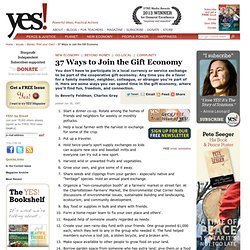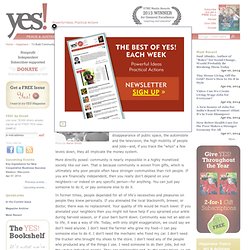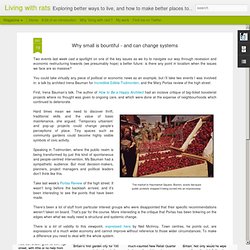

Future Positive » GIFTegrity. Giftegrity. GIFTegrity is a software that allows to organise the gift economy and non-reciprocal exchange, produced by Timothy Wilken and friends at Synearth.org.

Since it is somewhat complex to explain we start with a indirect citation, followed by the explanation by Dr. Wilken. All citations are from Synergic Economist Wayne F. Perg, Ph. “My concept and understanding of the GIFTegrity is one of a radical move away from trade-oriented or materialistic sort of exchange. Barter and monetary economies both tie together giving and receiving. The GIFTegrity does this by creating transparency, i.e., by creating good information on the SEPARATE giving and receiving actions of all members of the gifting tensegrity. I see the GIFTegrity bringing the exchange relationships of a living organism to human society.
I see the GIFTegrity as a powerful new vehicle for first supplementing and then eventually replacing our present exchange economy that relies on money and barter to facilitate exchange. 37 ways to join the Gift Economy. You don't have to participate in a local currency or service exchange to be part of the cooperative gift economy.

Any time you do a favor for a family member, neighbor, colleague, or stranger you're part of it. Here are some ways you can spend time in the gift economy, where you'll find fun, freedom, and connection. posted Jun 30, 1997 Start a dinner co-op. Rotate among the homes of friends and neighbors for weekly or monthly potlucks.Help a local farmer with the harvest in exchange for some of the crop.Put up a traveler.Hold twice-yearly sport supply exchanges so kids can acquire new skis and baseball mitts and everyone can try out a new sport.Harvest wild or unwanted fruits and vegetables.Grow your own, and give some of it away.Share seeds and clippings from your garden - especially native and "heritage" species. This article was published in the Spring 1997 issue of YES! Comment on this articleHow to add a comment – Commenting Policy.
To Build Community, an Economy of Gifts by Charles Eisenstein. For a multitude of reasons, we need to need each other. posted Dec 27, 2011 Wherever I go and ask people what is missing from their lives, the most common answer (if they are not impoverished or seriously ill) is "community.

" What happened to community, and why don't we have it any more? There are many reasons—the layout of suburbia, the disappearance of public space, the automobile and the television, the high mobility of people and jobs—and, if you trace the "whys" a few levels down, they all implicate the money system. More directly posed: community is nearly impossible in a highly monetized society like our own. In former times, people depended for all of life's necessities and pleasures on people they knew personally. Because people in gift culture pass on their surplus rather than accumulating it, your good fortune is my good fortune: more for you is more for me. That is one reason for the universally recognized superficiality of most social gatherings. Interested?
Occupy Wall St - The Revolution Is Love. Why small is bountiful - and can change systems. Two events last week cast a spotlight on one of the key issues as we try to navigate our way through recession and economic restructuring towards (we presumably hope) a better future: is there any point in localism when the issues we face are so massive?

You could take virtually any piece of political or economic news as an example, but i’ll take two events I was involved in: a talk by architect Irena Bauman for Incredible Edible Todmorden, and the Mary Portas review of the high street. First, Irena Bauman’s talk. The author of How to Be a Happy Architect had an incisive critique of big-ticket boosterist projects where no thought was given to ongoing care, and which were done at the expense of neighbourhoods which continued to deteriorate.
Hard times mean we need to discover thrift, traditional skills and the value of basic maintenance, she argued. ‘Temporary urbanism’ and pop-up projects could change people’s perceptions of place. Take last week’s Portas Review of the high street.